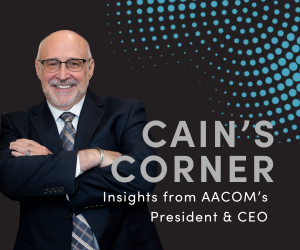Clinical Skills and the Call to Lead: Reaffirming Our Osteopathic Purpose
Published July 09, 2025
By Robert A. Cain, DO
Cains Corner
“To improve the present system of the practice of medicine…”
— Charter of the American School of Osteopathy, 1892
Today’s healthcare environment is full of challenges—distrust, disconnection and systems stretched too thin. For osteopathic medicine, this is a moment of reckoning. Do we stay in the shadows, or step forward with purpose?
In times like these, we must return to our foundation. The phrase in the founding charter of the American School of Osteopathy—“to improve the present system”—was not a passive observation. It was a bold mission. And to improve something as personal and complex as healthcare is, inherently, a choice to lead.
Leadership, in this sense, is not about status—it’s about responsibility. It means grounding change in values, not just policies. It means doing what others won’t, can’t or haven’t yet recognized as necessary. For the past two years, we’ve spoken often about the “social contract” that binds physicians to the communities they serve. That contract is under stress—not due to failures of science, but because our healthcare system routinely falls short in delivering the connection, communication and compassion patients expect and deserve.
Skills like empathy, listening and human connection are not “soft”—they are vital. And society knows when they’re missing.
A Response Rooted in Values: Reintroducing Clinical Skills Assessment as Part of Licensure
Against this backdrop, the National Board of Osteopathic Medical Examiners’ (NBOME) new clinical skills assessment program is a timely and needed step. It’s a response to both public and professional expectations. And yes, it asks more of our students who are already navigating intense demands. But what if that “more” is exactly what’s needed? What if it helps build the kind of care and connection patients are telling us they need most?
This is not about reviving the past, it’s about designing for the future. The NBOME’s updated program was developed in partnership with educators and students, guided by a shared commitment to fairness, effectiveness and public trust.
Osteopathic education has always emphasized humanistic care. We often hear: “Your students are already good at this.” So why assess it? Because trust in physicians doesn’t come just from titles or degrees. It comes from showing up—listening well, responding with empathy and making patients feel heard. These aren’t just nice-to-haves. They’re essential—and worth making sure every graduate can demonstrate.
It is understandable that some might question whether such an assessment is necessary—or feel our students are being asked to do something extra that their MD peers are not. But I challenge us to look through a different lens, and to ask what kind of physicians we want to be known for graduating. If this assessment helps ensure we’re honoring that vision, then it becomes less about doing more, and more about doing right.
Defining Success Beyond Scores
This program must not be reduced to a box-checking exercise. Its success should be measured not by pass rates, but by its ability to spark reflection, strengthen mentorship and refocus our collective energy on what truly matters to patients.
We must ask:
- Are our students better prepared and more confident as they transition to residency?
- Do patients experience a difference when encountering our graduates?
- Are our graduates living examples of compassionate care?
These are the questions that matter—not to prove value, but to deliver it.
The competencies we aim to assess—communication, empathy, clinical reasoning, professionalism—are not incidental. They are essential. And they are measurable.
To Lead Is to Serve the System We Seek to Improve
A.T. Still did not set out to replicate the medical system of his time. He set out to reform it. To improve it. To lead, not follow. And in doing so, he placed on all of us a responsibility—to question, to elevate and to act.
If we shy away from defining what matters most in medical care, we risk letting others do it for us. But if we stand behind our values—publicly, clearly and consistently—we help ensure they stay part of the profession’s future.
This is not about one assessment. It’s about reaffirming who we are.
Charting the Course Together
Let us return, then, to the charter: “To improve the present system of the practice of medicine.” That call is as urgent today as it was then. To improve means to lead. And to lead means to act—not in isolation, but in collaboration. Not for recognition, but for responsibility.
We are not just preparing students for an exam. We are preparing them for society. Let’s ensure that every part of what we do—from curriculum to licensing—reflects that truth.
Let’s take this step—together. Even when it’s hard. Especially when it’s hard. Because patients are watching. And because the kind of care they deserve starts with how we prepare to deliver it.

Robert A. Cain, DO
AACOM President and CEO

